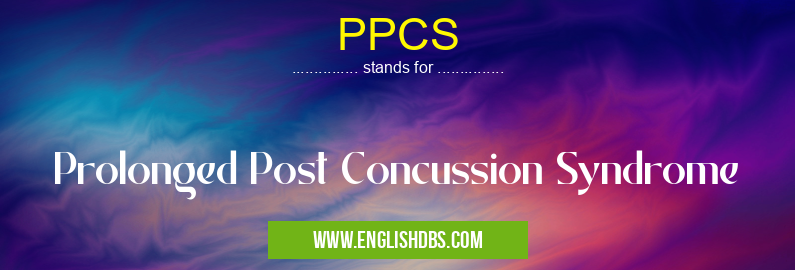What does PPCS mean in SYNDROMES
PPCS is a condition that occurs after a concussion and lasts longer than the typical recovery period of 4-12 weeks. It is characterized by persistent symptoms that can impact various aspects of an individual's physical, cognitive, and emotional health.

PPCS meaning in Syndromes in Medical
PPCS mostly used in an acronym Syndromes in Category Medical that means Prolonged Post Concussion Syndrome
Shorthand: PPCS,
Full Form: Prolonged Post Concussion Syndrome
For more information of "Prolonged Post Concussion Syndrome", see the section below.
- Prolonged Post Concussion Syndrome (PPCS) refers to a persistent cluster of symptoms that can linger for weeks, months, or even years after a concussion.
Symptoms of PPCS
- Physical: Headaches, dizziness, fatigue, neck pain, and sensitivity to light or sound
- Cognitive: Difficulty concentrating, memory problems, impaired judgment, and slowed thinking
- Emotional: Irritability, anxiety, depression, and mood swings
- Sleep: Insomnia, nightmares, and excessive daytime sleepiness
Causes of PPCS
- The exact cause of PPCS is unknown, but it is believed to result from ongoing inflammation and disruption of brain function after a concussion.
Diagnosis of PPCS
- Diagnosis involves a detailed medical history, physical examination, and neuropsychological testing.
Treatment of PPCS
- Treatment focuses on managing symptoms and improving function. Options include:
- Rest and gradual return to activities
- Medication for headaches, dizziness, or sleep problems
- Physical and occupational therapy
- Cognitive rehabilitation
Essential Questions and Answers on Prolonged Post Concussion Syndrome in "MEDICAL»SYNDROMES"
What is Prolonged Post Concussion Syndrome (PPCS)?
What are the common symptoms of PPCS?
Symptoms of PPCS can vary but may include headaches, dizziness, fatigue, difficulty concentrating, memory problems, irritability, and sensitivity to light and sound. Physical symptoms such as muscle weakness, balance issues, and sleep disturbances may also be present.
How is PPCS diagnosed?
A diagnosis of PPCS typically involves a comprehensive evaluation by a healthcare professional, such as a neurologist or sports medicine specialist. They will assess the individual's symptoms, medical history, and perform a physical and neurological examination. Imaging tests such as CT scans or MRIs may be used to rule out other underlying conditions.
What are the treatment options for PPCS?
Treatment for PPCS focuses on managing symptoms and improving overall function. This may include a combination of therapies, such as:
- Physical therapy to address balance and coordination issues
- Cognitive rehabilitation to improve memory and problem-solving skills
- Psychotherapy to manage emotional and behavioral challenges
- Medications to alleviate specific symptoms, such as headaches or sleep disturbances
How long does it take to recover from PPCS?
The recovery time for PPCS varies significantly between individuals. Some may gradually improve within months, while others may experience symptoms for years. It is important to work closely with healthcare professionals to develop an individualized treatment plan and monitor progress over time.
Can PPCS be prevented?
While there is no guaranteed way to prevent PPCS, there are certain steps that can help reduce the risk, such as:
- Wearing appropriate protective gear during activities that carry a risk of head injury
- Following proper concussion protocols and seeking medical attention after a head injury
- Managing underlying health conditions that may increase the likelihood of concussions
Final Words:
- PPCS is a complex condition that requires ongoing care and support. By understanding the symptoms, causes, and treatment options, individuals and healthcare professionals can work together to manage PPCS effectively and promote recovery.
PPCS also stands for: |
|
| All stands for PPCS |
